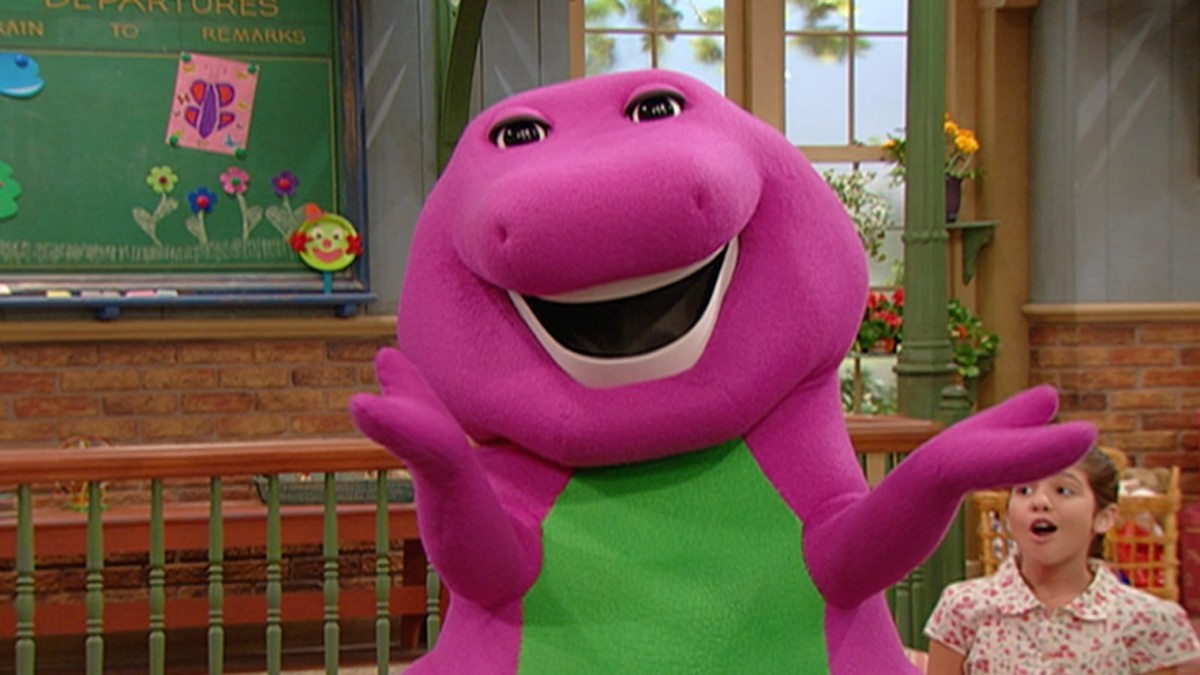‘The high-profile hate was really coming from men’: Media expert explains why toxic men hated Barney the Dinosaur

Media professor Dr. Emily Contois recently tried to explain the source of hatred for Barney the Dinosaur, explaining that much hate came from toxic men who believed the purple dinosaur was “feminine.”
Barney, the purple anthropomorphic T-Rex, became a childhood icon through Barney & Friends, which ran from 1992 to 2010. Most 90s kids remember him as the lovable dinosaur that sang, danced, and was brimming with love and affection. They likely didn’t realize until later that Barney sparked many extreme emotions in adults. As strange as it sounds, “Barney hatred” and “anti-Barney humor” became actual phenomena over the years. The hatred ranged from weird to horrifying, including an SNL skit of Charles Barkley brutally facing off with the purple dinosaur and Barney & Friends musical director Bob Singleton getting “horrible, horrible death and dismemberment threats” directed at him and his family.
Books and documentaries like I Love You, You Hate Me have explored the bizarre phenomenon of Barney hatred before, struggling to get to the root of the extreme reactions. Recently, cast and crew members have been revisiting the backlash and threats they received on the show in the new podcast Generation Barney. In the latest episode, Dr. Contois offered an explanation for some of the hatred.
Dr. Emily Contois on why men hated Barney so much
Dr. Contois teaches media studies at the University of Tulsa and has studied anti-fandom. Appearing on Generation Barney, she explained that much of the Barney hatred likely had to do with toxic masculinity. Host Sabrina Herrera noted that the hate campaign against Barney was primarily led by men, stating, “There were women who didn’t like Barney, but the high-profile hate was really coming from men.” Dr. Contois agreed, noting that the problem was that Barney “offered up a different model of masculinity, even as a purple dinosaur and not a human.”
Dr. Contois goes on to explain that toxic men hated Barney’s message of kindness, emotion, and affection. She states, “This message about love, about nurturing, about looking after others, that these are emotions and also sort of social practices and responsibilities that in our culture are constructed and understood to be sort of feminine and feminizing.” So, these men saw this character, who was appealing and lovable to children, failing to embody their view of masculinity, which likely felt threatening and raised suspicions of his sexuality.
Dr. Contois concluded, “Barney could be understood as resisting that, pushing back against that, offering a different model of sexuality and gender and size all coming together. And so for some of these men who reacted very poorly to him, that could be a piece of their reaction. A part of that White masculine sort of set of authorities is also this incredible resistance to homosexuality.” The hatred wasn’t just about gender and sexuality, though. Race also played a role in the hatred as backlash arose when viewers realized one of the actors who wore the Barney suit, David Joyner, was African American. Joyner has recalled learning that the Ku Klux Klan banned their children from watching Barney because of his casting.
Those listening to the podcast will likely find the tale and explanation of Barney’s hatred oddly familiar. The hatred for Barney isn’t hard to understand, considering the same phenomenon is happening today: male adults are frequently, inordinately triggered by characters in children/family TV shows and movies. Anytime any BIPOC, LGBTQ+, or female character/actor is included anywhere in TV and film, adult men are always the source of the loudest, most prominent meltdowns. Dr. Contois’ explanation for Barney hatred reminds us that “anti-woke” policing isn’t new. For over three decades, the same fragile, toxic men have had nothing better to do than be weirdly invested in baby shows and start their hate campaigns anytime a character isn’t an exact reflection of themselves and their own beliefs.
Have a tip we should know? [email protected]